I loved you so much once. I did. More than anything in the whole wide world. Imagine that. What a laugh that is now. Can you believe it? We were so intimate once upon a time I can't believe it now. The memory of being that intimate with somebody. We were so intimate I could puke. I can't imagine ever being that intimate with somebody else. I haven't been.Raymond Carver
It ought to make us feel ashamed when we talk like we know what we're talking about when we talk about love.Raymond Carver
I've crossed some kind of invisible line. I feel as if I've come to a place I never thought I'd have to come to. And I don't know how I got here. It's a strange place. It's a place where a little harmless dreaming and then some sleepy, early-morning talk has led me into considerations of death and annihilation.Raymond Carver
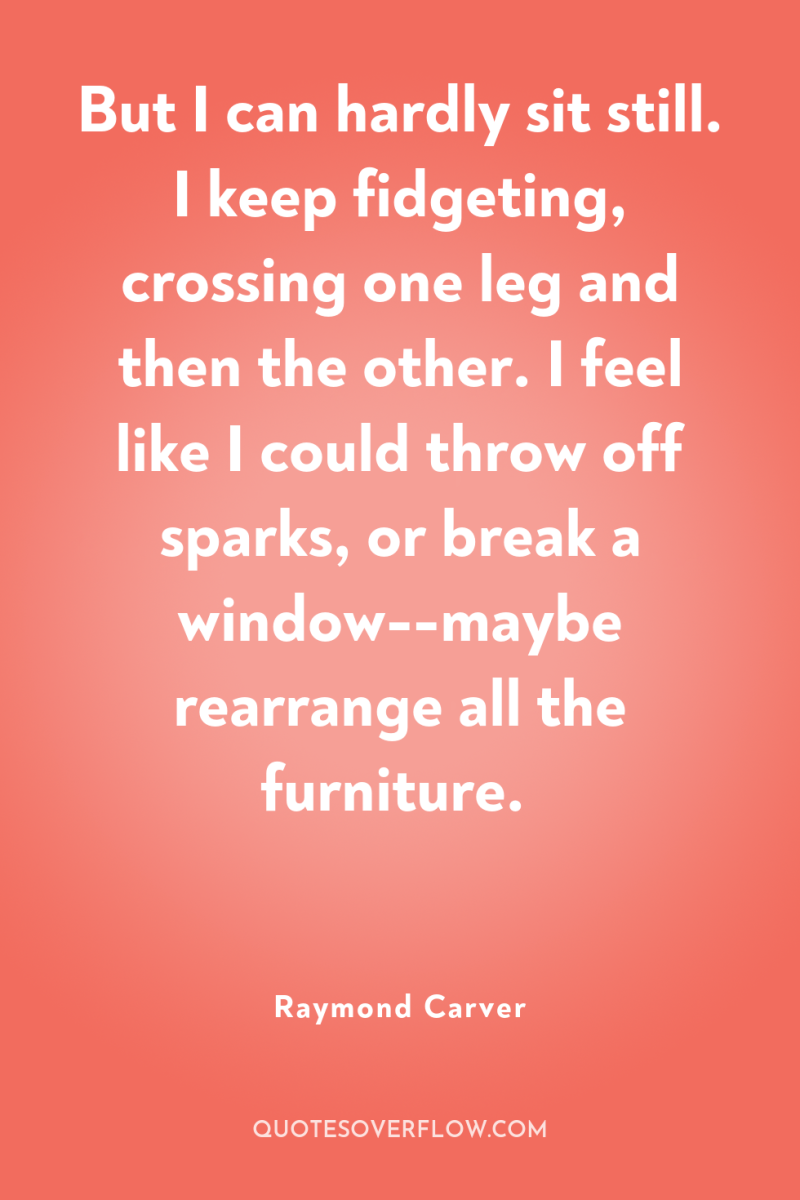
But I can hardly sit still. I keep fidgeting, crossing one leg and then the other. I feel like I could throw off sparks, or break a window--maybe rearrange all the furniture.Raymond Carver
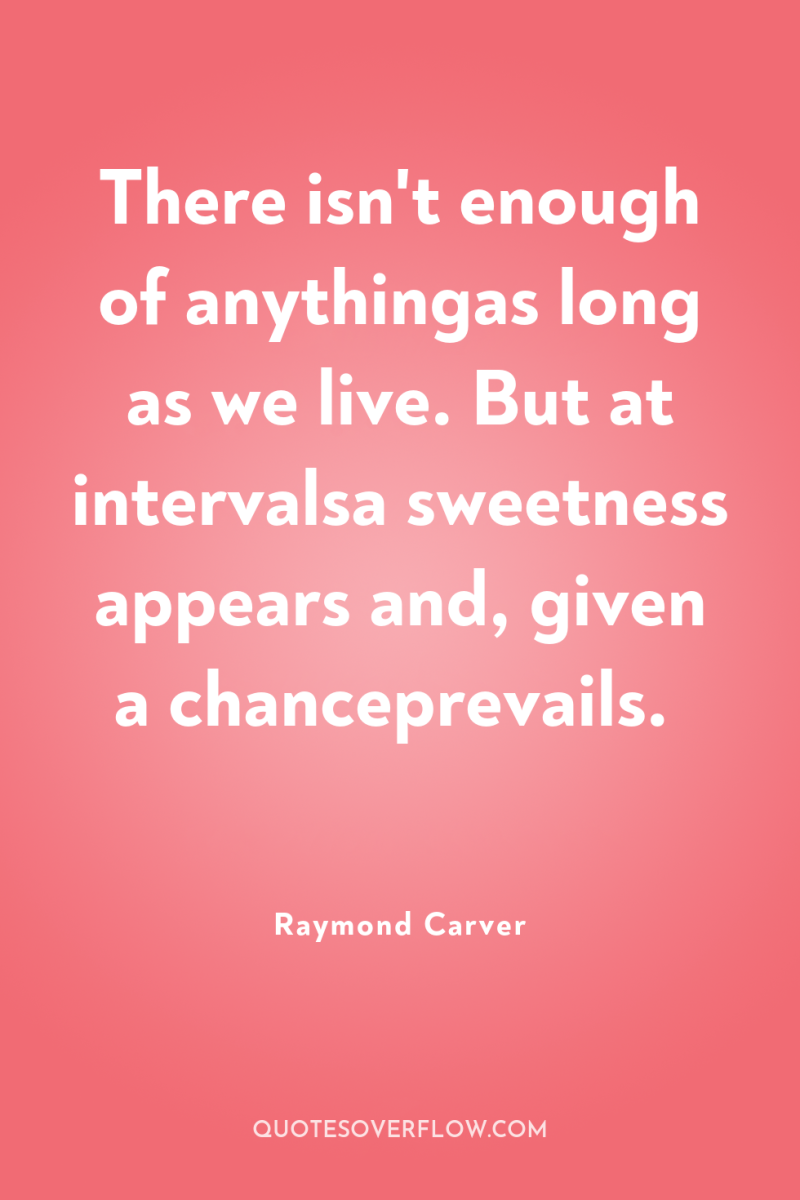
There isn't enough of anythingas long as we live. But at intervalsa sweetness appears and, given a chanceprevails.Raymond Carver
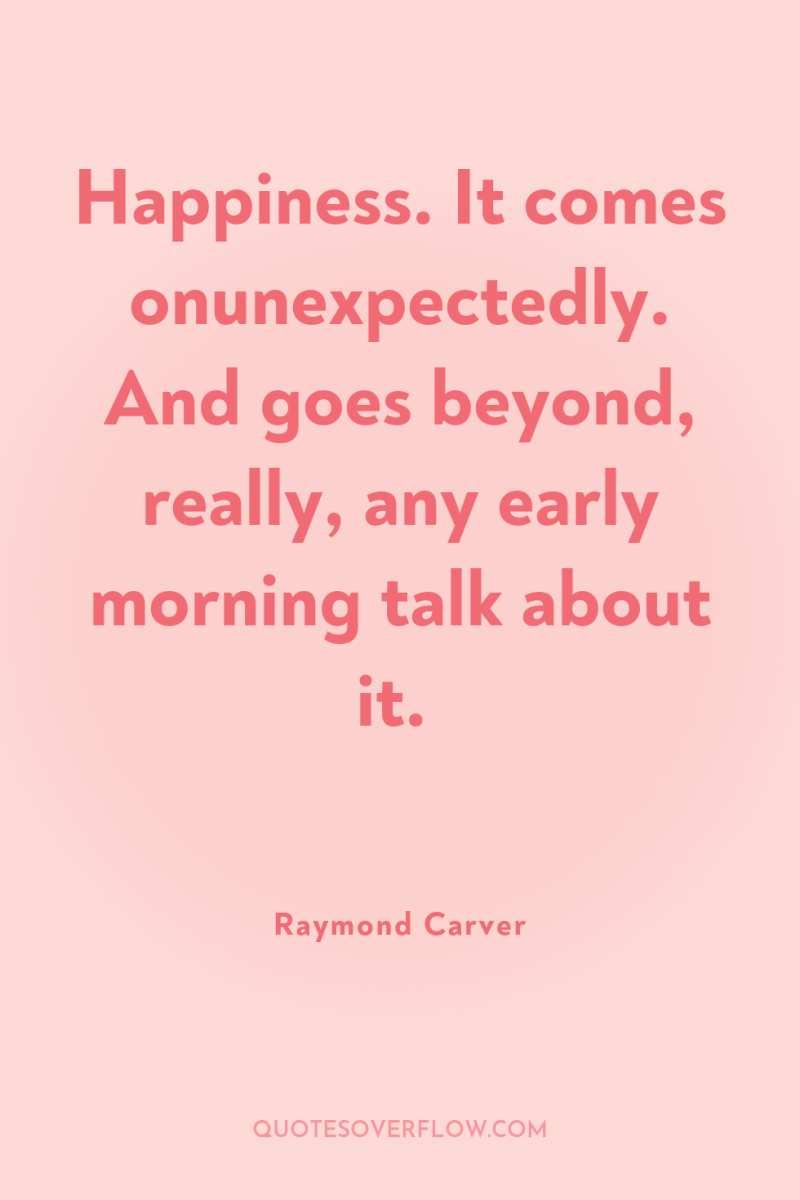
Happiness. It comes onunexpectedly. And goes beyond, really, any early morning talk about it.Raymond Carver
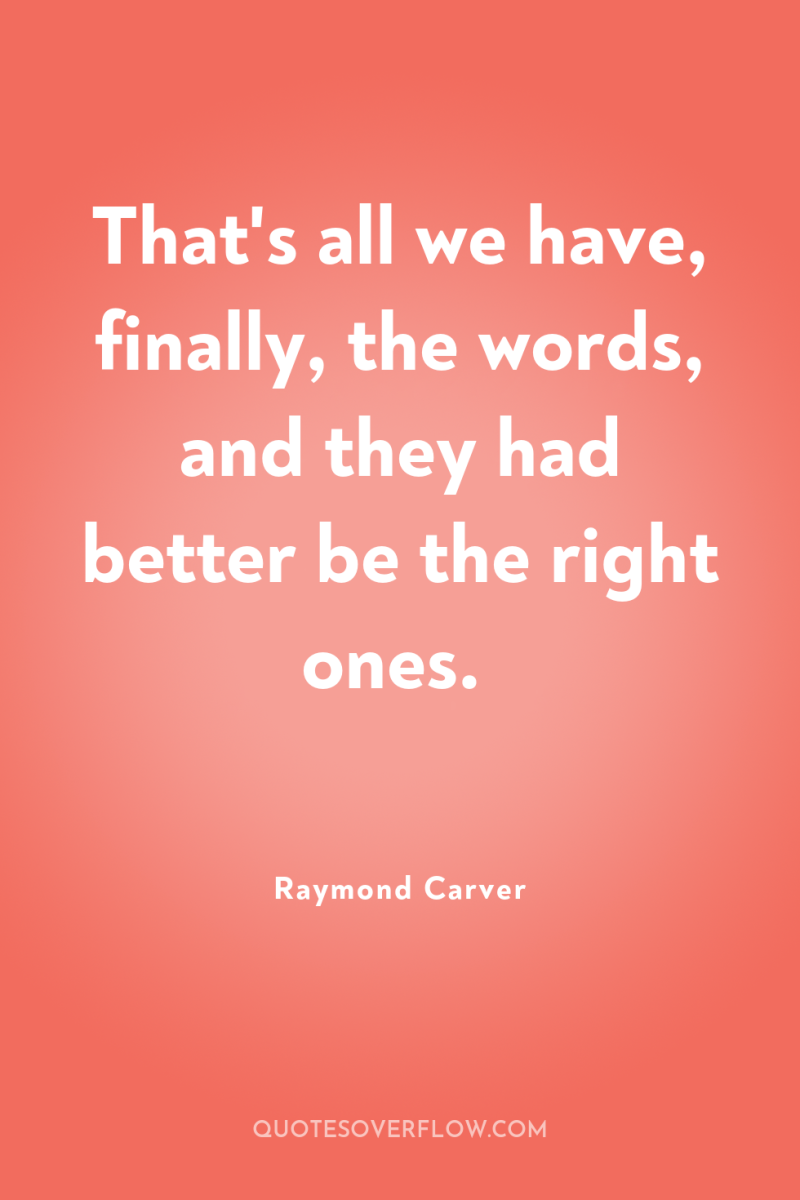
That's all we have, finally, the words, and they had better be the right ones.Raymond Carver
It's possible, in a poem or a short story, to write about commonplace things and objects using commonplace but precise language, and to endow those things-- a chair, a window curtain, a fork, a stone, a woman's earring-- with immense, even startling power. It is possible to write a line of seemingly innocuous dialogue and have it send a chill along the reader's spine-- the source of artistic delight, as Nabokov would have it. That's the kind of writing that most interests me.Raymond Carver
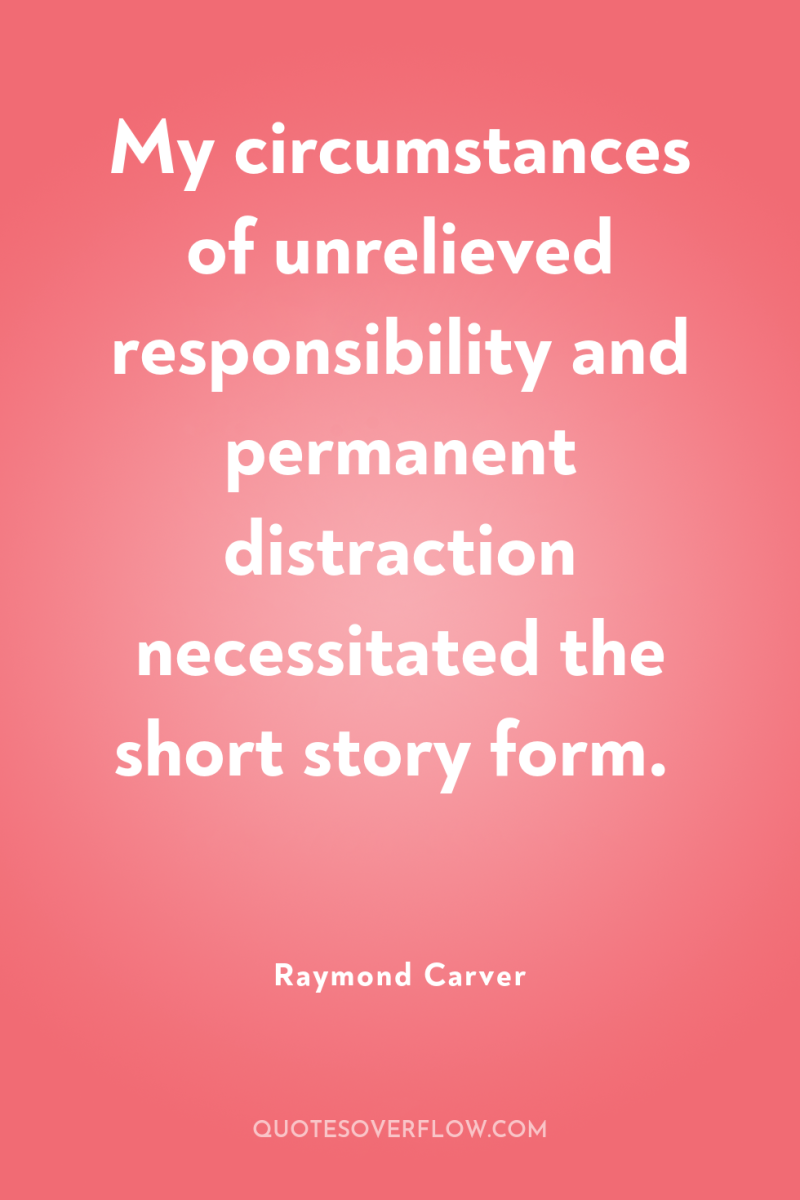
My circumstances of unrelieved responsibility and permanent distraction necessitated the short story form.Raymond Carver
Evan Connell said once that he knew he was finished with a short story when he found himself going through it and taking out commas and then going through the story again and putting the commas back in the same places. I like that way of working on something. I respect that kind of care for what is being done. That's all we have, finally, the words, and they had better be the right ones, with the punctuation in the right places so that they an best say what they are meant to say. If the words are heavy with the writer's own unbridled emotions, or if they are imprecise and inaccurate for some other reason -- if the worlds are in any way blurred -- the reader's eyes will slide right over them and nothing will be achieved. Henry James called this sort of hapless writing 'weak specification'.Raymond Carver
V.S. Pritchett's definition of a short story is 'something glimpsed from the corner of the eye, in passing.' Notice the 'glimpse' part of this. First the glimpse. Then the glimpse gives life, turned into something that illuminates the moment and may, if we're lucky -- that word again -- have even further ranging consequences and meaning. The short story writer's task is to invest the glimpse with all that is in his power. He'll bring his intelligence and literary skill to bear (his talent), his sense of proportion and sense of the fitness of things: of how things out there really are and how he sees those things -- like no one else sees them. And this is done through the use of clear and specific language, language used so as to bring to life the details that will light up the story for the reader. For the details to be concrete and convey meaning, the language must be accurate and precisely given. The words can be so precise they may even sound flat, but they can still carry; if used right they can hit all the notes.Raymond Carver
She serves me a piece of it a few minutesout of the oven. A little steam risesfrom the slits on top. Sugar and spice -cinnamon - burned into the crust. But she's wearing these dark glassesin the kitchen at ten o'clockin the morning - everything nice -as she watches me break offa piece, bring it to my mouth, and blow on it. My daughter's kitchen, in winter. I fork the pie inand tell myself to stay out of it. She says she loves him. No waycould it be worse.Raymond Carver
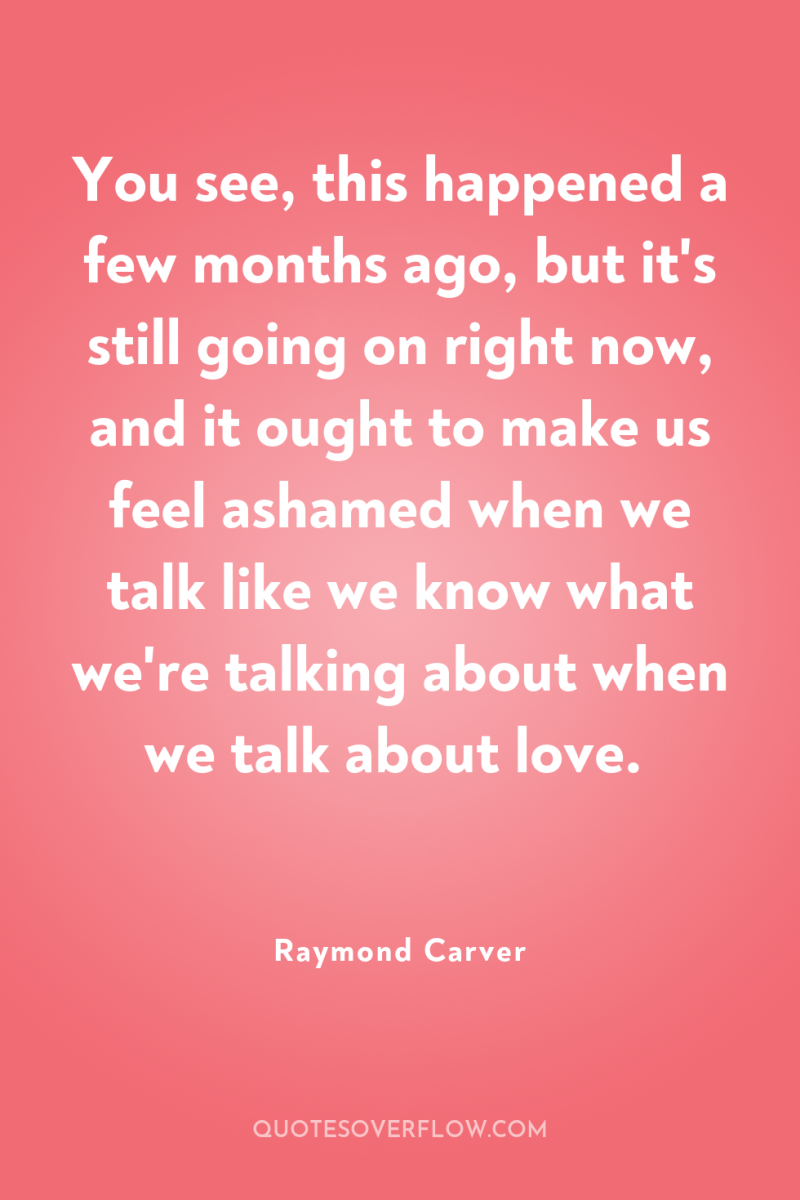
You see, this happened a few months ago, but it's still going on right now, and it ought to make us feel ashamed when we talk like we know what we're talking about when we talk about love.Raymond Carver
That's right, ' Mel said. 'Some vassal would come along and spear the bastard in the name of love. Or whatever the fuck it was they fought over in those days.' Same things we fight over these days, ' Terri said. Laura said, 'Nothing's changed.Raymond Carver

Dreams, you know, are what you wake up from.Raymond Carver
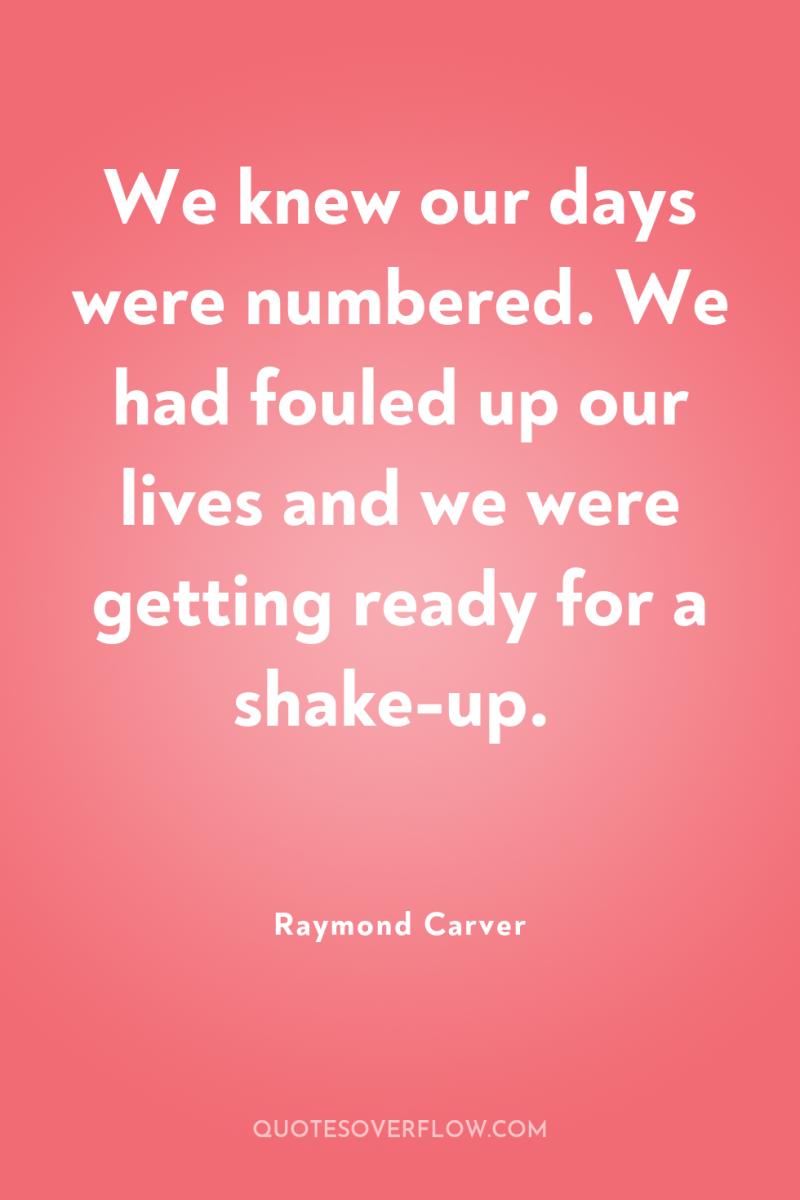
We knew our days were numbered. We had fouled up our lives and we were getting ready for a shake-up.Raymond Carver
I'm a heart surgeon, sure, but I'm just a mechanic. I go in and I fuck around and I fix things. Shit.Raymond Carver
I could hear my heart beating. I could hear everyone's heart. I could hear the human noise we sat there making, not one of us moving, not even when the room went dark.Raymond Carver
They had laughed. They had leaned on each other and laughed until the tears had come, while everything else--the cold, and where he'd go in it--was outside, for a while anyway.Raymond Carver
I don't fire up the prose. I just tell it straight and don't fool around with it.Raymond Carver
When you live in the dark for so long, you begin to love it. And it loves you back, and isn’t that the point? You think, the face turns to the shadows, and just as well. It accepts, it heals, it allows. But it also devours.Raymond Carver
I'm always learning something. Learning never ends.Raymond Carver
They talked on into the early morning, the high, pale cast of light in the windows, and they did not think of leaving.Raymond Carver
Grief"Woke up early this morning and from my bedlooked far across the Strait to seea small boat moving through the choppy water, a single running light on. Rememberedmy friend who used to shouthis dead wife’s name from hilltopsaround Perugia. Who set a platefor her at his simple table long aftershe was gone. And opened the windowsso she could have fresh air. Such display I found embarrassing. So did his otherfriends. I couldn’t see it. Not until this morning.Raymond Carver
And the terrible thing, the terrible thing is, but the good thing too, the saving grace, is that if something happened to one of us--excuse me for saying this--but if something happened to one of us tomorrow, I think the other one, the other person, would grieve for a while, you know, but then the surviving party would go out and love again, have someone else soon enough. All this, all of this love we're talking about, it would just be a memory. Maybe not even a memory.Raymond Carver
Nights without beginning that had no end. Talking about a past as if it'd really happened. Telling themselves that this time next year, this time next year, things were going to be different.Raymond Carver
I'm moving to Nevada. Either there or kill myself.Raymond Carver
There was a time when I thought I loved my first wife more than life itself. But now I hate her guts. I do. How do you explain that? What happened to that love? What happened to it, is what I'd like to know. I wish someone could tell me.Raymond Carver
If we're lucky, writer and reader alike, we'll finish the last line or two of a short story and then just sit for a minute, quietly. Ideally, we'll ponder what we've just written or read; maybe our hearts or intellects will have been moved off the peg just a little from where they were before. Our body temperature will have gone up, or down, by a degree. Then, breathing evenly and steadily once more, we'll collect ourselves, writers and readers alike, get up, "created of warm blood and nerves" as a Chekhov character puts it, and go on to the next thing: Life. Always life.Raymond Carver
Honey, no offense, but sometimes I think I could shoot you and watch you kick.Raymond Carver
But dying is for the sweetest ones. And he remembers sweetness, when life was sweet, and sweetly he was given that other lifetime.Raymond Carver
Write what you know, and what do you know better than your own secrets?Raymond Carver
This is awful. I don't know what's going to happen to me or to anyone else in the world.Raymond Carver
I lifted him out. I held him. I held that half of him.Raymond Carver
The places where water comes together with other water. Those places stand out in my mind like holy places.Raymond Carver
There was this funny thing of anything could happen now that we realized everything had.Raymond Carver
Then I said something. I said, Suppose, just suppose, nothing had ever happened. Suppose this was for the first time. Just suppose. It doesn't hurt to suppose. Say none of the other had ever happened. You know what I mean? Then what? I said.Raymond Carver
Life and death matters, yes. And the question of how to behave in this world, how to go in the face of everything. Time is short and the water is rising.Raymond Carver